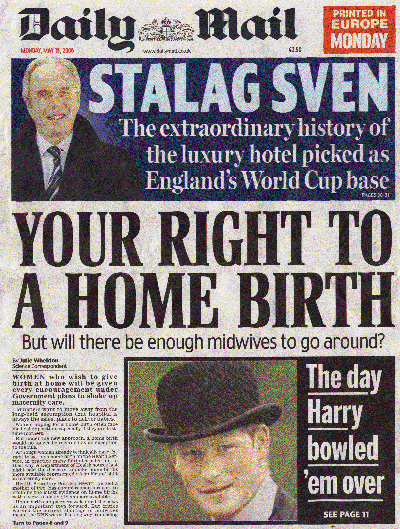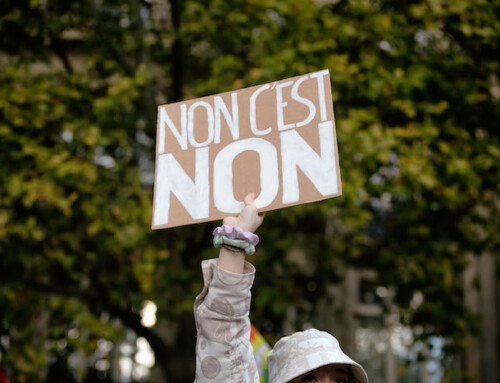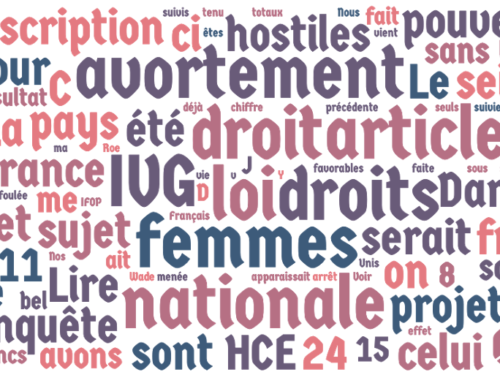But will there be enough midwives to go around?
By Julie Wheldon
Science Correspondent
Daily Mail, 15 May 2006, pages 1, 8–9.
Voir la traduction de cet article. Il y est question de l’accouchement à domicile, une option soutenue par le ministère de la santé au Royaume Uni depuis le rapport parlementaire Changing Chilbirth en 1992 (voir historique). Un rapport récent a montré que, pour répondre à la demande croissante d’accouchements à domicile et respecter ainsi la liberté de choix des usagers du service de santé, l’État devrait former environ 10 000 sages-femmes de plus.

Can the NHS really deliver the choice?
‘It would be a big and a very popular change’
[NHS = National Health Service in the United Kingdom]
Women who wish to give birth at home will be given every encouragement under Government plans to shake up maternity care.
Ministers want to move away from the long-held assumption that hospital is always the safest place to deliver babies.
Women hoping for a home birth often face medical opposition, especially if they are firsttime mothers.
But under the new approach, a home birth would no longer be regarded as an exception to the rule.
Although women already technically have the right to ask for a home birth on the Health Service, in practice many find obstacles put in their way. A Department of Health source last night said the decision to make home births more available represented a ‘significant’ shift in maternity care.
Health Secretary Patricia Hewitt, herself a mother of two, has commissioned a report to examine the latest evidence on home births with a view to making them more available.
Home birth campaigners welcomed the news as an important step forward. But critics warned the current shortage of midwives meant the NHS was still a long way from being able to provide such a choice to all pregnant women.
Only last week the Royal College of Midwives warned that half of all health trusts, weighed down by debt, are not replacing midwives who leave the NHS.
Giving birth in hospital as a matter of course is a relatively recent practice.
Up until 1955, a third of babies born to married couples were delivered at home.
By 1975 this had plummeted to a mere 3.3 per cent.
The latest figures available show that in 2004 more than 15,000 babies were born at home in Britain.
This is a 7 per cent rise on the previous year.
Even so, it still represents just 2 per cent of the 716,000 births each year in Britain.
Campaigners believe women face a ‘postcode lottery’ on whether they give birth at home or hospital.
In many areas a lack of midwives restricts their choices. Although expectant mothers can ask for a home birth, they often find cashstrapped health trusts which are short of staff cannot provide the services they would need.
Many first-time mothers are also put off home births by hospital staff who make them fear they could not cope without an epidural or could be risking their baby’s safety by failing to have a full medical team on hand.
Women who have previously had a normal delivery without complications tend to be more confident in demanding a home birth.
In most NHS hospitals a midwife will be responsible for two or three labouring women at the same time.
During a home birth, however, one-on-one care is guaranteed. It is estimated the NHS would need an extra 10,000 midwives to provide such care for all women giving birth.
Home births also allow women to move around more freely, which has been shown to reduce the risk of needing intervention, such as forceps, to deliver the baby.
The woman is also thought to be more relaxed in her own environment. This often results in a shorter labour.
However those giving birth at home cannot be given the strongest pain-relieving drugs or an epidural.
Access to surgery in the case of emergency is also compromised.
In one study, as many as four in ten first-time mothers giving birth at home ended up transferring to hospital to complete their labour.
One in ten who had given birth before also had to go to hospital.
The National Childbirth Trust said women were often discouraged from even considering a home birth, even in cases in which it was the best option.
Chief executive Belinda Phipps said more Government support would overturn the view that began in the 1970s — and was based on flawed statistical analysis — that home births were unsafe.
‘It would be a very big step forward and a significant change,’ she said. ‘It would be a very popular move.’
She said the Government would have to recruit more midwives, help those who had left to return to the profession and tackle the problem of NHS managers who often wrongly believed home births are unsafe.
‘There will be a gap until these things can start to change but it will be the job of organisations such as ours to stay on top of this to make sure it does happen,’ she said.
Tory health spokesman Andrew Lansley questioned how the overstretched NHS would cope with extra demand for home births.
He said at least three-quarters of maternity units were short of staff.
In some areas the number of home visits midwives could make was declining.
‘It seems that the Health Secretary Patricia Hewitt lives in an unreal world,’ he said. ‘If there are not enough midwives this is not going to happen.’
‘Instead of hinting about more initiatives, she should deliver what has been the policy for decades, which is giving women genuine choice.’
A Department of Health spokesman said: ‘We are committed to offering all women choice of how and where they give birth, and what pain relief is available.’
She said the Government underlined its commitment to delivering choice in maternity services in its 2005 manifesto, through its National Service Frameworks and in a recent White Paper.
‘All these services will be offered within the context of what is safe and clinically appropriate care for each individual woman,’ she said.
She said the NHS had 2,500 more midwives than in 1997.
The number of students entering the profession had risen by 41 per cent in the same period.
j.wheldon(arobase)dailymail.co.uk
So was home birth the best option for these two mothers?
YES
Darja Brandenburg-Antory, 32, is a psychologist. She lives in Coventry with her husband David, daughter Dewi, two, and son Damai, three months. She says:
I had had my first child in hospital and although I didn’t have a bad experience, I didn’t like the clinical, soulless environment.
So when I found out I was pregnant again, I chose to give birth at home. Having a baby should be a celebration and I wanted my son’s arrival to feel that way — special to us instead of just another birth in a maternity ward.
People often worry that if something goes wrong the baby will be in danger because you aren’t in a hospital.
If you live very far from a hospital then this is a consideration, but as long as you have a midwife with you there shouldn’t be a problem.
She should spot any issues long before they become life-threatening, which means you have plenty of time to call an ambulance. Of course there are risks, but childbirth carries risks regardless of where you have the baby.
My husband also believed this to be the best option because all the equipment necessary, such as monitors, can be used at home. He wanted to be sure the baby and I would be safe.
The only things you can’t have are pain-relieving drugs such as pethidine or an epidural, and if you need intervention such as a caesarean you will have to go into hospital.
I went into labour at […] weeks on January 29 this year. Immediately we started to prepare the house for the birth, filling a birthing pool, protecting the floor with plastic sheets and lighting aromatherapy candles to help me relax.
My waters broke in the evening and for the next 12 hours my contractions were light. The next day I was able to go for a walk and have a lovely breakfast with my husband and daughter Dewi. There was no sense of panic or stress.
David and I both wanted Dewi to be present throughout. I had explained to her what would happen and she was very excited about it all.
Childbirth is an amazing, natural thing that children should be allowed to see. There is no reason why kids should be left out.
Dewi loved being there. She didn’t see the baby coming out but she was in the room the whole time, being looked after by my friend and my husband, while the midwife attended to me.
As with my first baby, I didn’t suffer any terrible pain and had a very easy delivery. At 1.30pm I gave birth to a healthy baby boy, Damai, who weighed 6lb 4oz.
I used gas and air, but had no need for any other pain relief. The midwife told me it was a textbook home delivery.
I was much more relaxed than during my first labour, partly because I knew what to expect and because I was at home.
The midwife ran me a bath and afterwards we opened a bottle of champagne and sat on the couch celebrating our new arrival.
We sat there for hours just holding him, and it was wonderful to be able to put the baby straight into his cot in his own bedroom. It was the perfect day.
NO
Angela Howard, 34, is a housewife in London. She lives with her partner Colin Howard, 34, who runs his own business, and their son Luca, 20 months. She says:
A home birth seemed like the perfect way to bring my first baby into the world.
I thought it would be much more relaxing to have him in the comfort of my own house than in hospital, which had always seemed like an unnatural environment to me.
My partner Colin and I weighed up the pros and cons of staying at home.
Our main concern was what would happen if something went wrong, but our local hospital is just round the corner so we knew that if there were any complications we could get there quickly.
After consulting my GP and midwife, I decided to have a pool set up in my front room as the water can help ease the pain of contractions.
By the time my contractions started on the Thursday evening everything was in place for me to have the perfect home birth.
We called the midwife, who came round and gave me an internal examination. She said I was in the very early stages and that she would pop back the next day.
By the morning I was in complete agony, but my contractions were still irregular, anything between two and seven minutes apart, and my waters had still not broken.
When the midwife came back at 6pm my cervix was still only 1cm dilated.
Thankfully, my waters finally broke a few hours later, but the pain was getting worse.
Colin filled the pool late on the Friday night, but it didn’t make the slightest difference to the pain.
Had I been in hospital I could have been given pethidine, a drug similar to morphine, to ease the pain, but you can’t have it at home.
All I had was gas and air, but after finishing off two canisters of gas, I was begging for something stronger.
By Saturday afternoon I was completely exhausted and my dream of having the perfect home delivery had been shattered.
Emotionally I was completely drained. Forty-eight hours later and still only 3 cm dilated, I knew it was time to go to hospital. I thought I was going to die.
An hour later I was in hospital, where they gave me an epidural which enabled me to grab a couple of hours’ sleep. I was also given a drug to help speed up the contractions.
When I woke up I was ready to push. I was so relieved that It would be over.
At 11.56 pm Luca was born, weighing 7Ib 4oz. I was delighted he was safe and well, but too tired to appreciate what should have been a wonderful moment.
Two years on I am still scarred by the experience. Now I would seriously consider adoption because I’m not sure I could go through that again.






La traduction de ce texte est en cours